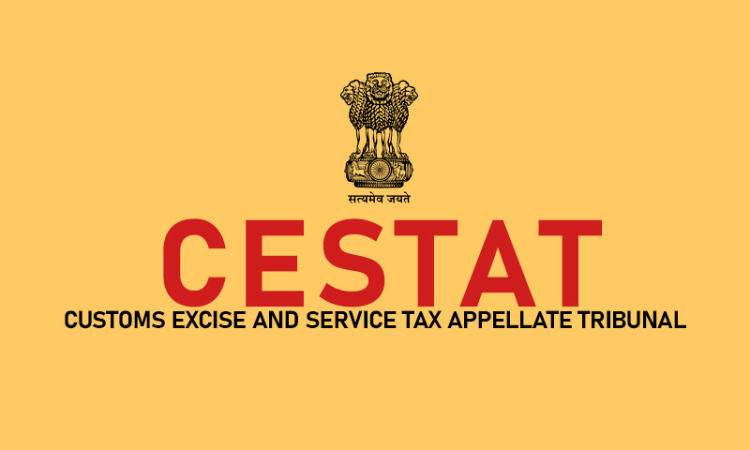No Service Tax Payable On Freight Margin Recovered From Customer In Case Of Outbound Shipment: CESTAT
Mariya Paliwala
17 May 2024 1:30 PM GMT
The Ahmedabad Bench of Income Tax Appellate Tribunal (ITAT) has held that no service tax is payable on freight margin recovered from customers in cases of outbound shipment.The bench of Somesh Arora (Judicial Member) and C.L. Mahar (Technical Member) has observed that the place of provision of service or transportation of goods shall be the place of destination of the goods, as per Rule 10 of...
The Ahmedabad Bench of Income Tax Appellate Tribunal (ITAT) has held that no service tax is payable on freight margin recovered from customers in cases of outbound shipment.
The bench of Somesh Arora (Judicial Member) and C.L. Mahar (Technical Member) has observed that the place of provision of service or transportation of goods shall be the place of destination of the goods, as per Rule 10 of the POP Rules. In the case of outbound shipment, both by aircraft and vessel, the destination of goods shall be outside India. Therefore, the place of provision of service for outbound shipment shall be outside India; hence, there will be no service tax on the freight margin recovered by the applicant from the customer.
The appellant firm or assessee, being a proprietary concern, is registered for the service tax under the category of 'Clearing and Forwarding Agent Service' and has been complying with the provisions of the service tax law prevalent at the relevant time. During the course of the inquiry into the financial record of the appellant, the department observed that freight income as expenses incurred towards freight expenses were less than freight charged by the appellant from their customers. There was some positive difference in expenses that have been incurred by the appellant. This income, as per the department, is nothing but an excess amount charged by the appellant to their customers towards ocean freight.
The department, after verification of the accounts, issued a show cause notice to the appellant demanding service tax under Section 73(1) of the Finance Act, 1994. The interest and penal provisions were also invoked as per the provisions of the Finance Act, 1994. The department has demanded a service tax under the category of business auxiliary services, stating that the differential amount of freight retained by them is nothing but commission received towards the provision of service. The matter got adjudicated, and the original adjudicating authority confirmed all the charges. The appellant filed an appeal before the Commissioner (Appeals) but did not succeed.
The appellant contended that since the very beginning, as per Board Circular, no service tax is payable on ocean freight, and they have not collected any service tax from their clients or customers, as there was a common belief in the trade that no service tax is payable on ocean freight. The proprietor of the firm, appearing during the course of the hearing, stated that for the pre-negative period, there was no specific taxable category for ocean transportation of goods by a vessel or ship. For the post-negative list, it is stated by the appellant that all services except the service specified in the negative list have been brought under the category of taxability, and therefore ocean freight is also classified as a service. However, for classifying under a taxable service category, the place of provision of service and destination of the goods shall be matters of importance for the determination of the levy of service tax. Since in the case of export cargo, the place of provision of service is outside the taxable territory of India, ocean freight for the export cargo becomes non-taxable.
The department contended that the main service of transportation of goods is provided by the airline or shipping agency and not by the applicant. Therefore, Rule 10 of the POP Rules will not be applicable to the applicant. The applicant submits that Rule 10 is wide enough to cover not only actual transportation but also a person who arranges for the transport, and that this is expressly clear from the exclusion to mail or courier from Rule 10 of POP Rules. A proviso to Rule 10 suggests the place of provision of service with respect to the goods transport agency (GTA). But for exclusion, courier or GTA would be covered by Rule 10.
The CESTAT has held that, in the absence of a specific exclusion, services provided by the applicant cannot be excluded from the scope of Rule 10 of the POP Rules.
The tribunal held that the appellant would enter into an agreement with the carrier for the transportation of cargo, i.e., the airline /shipping line. The service agreement would be on a principal-to-principal basis and not as an agent of said airline or shipping line. Therefore, the applicant would be covered by the exclusion clause, i.e., provide the main service—inbound and outbound shipment—on his own account in terms of Rule 2(f) of the POP Rules and thus not covered under Rule 9(c) as "intermediary" service. Therefore, the place of provision of service will not be the location of the service provider.
Counsel For Appellant: Vishal T. Gohel
Counsel For Respondent: Ajay Kumar Samota
Case Title: Vishal Tansukhbhai Gohel Versus Commissioner of Central Excise & ST, Rajkot
Case No.: Service Tax Appeal No. 10867 of 2017-DB


